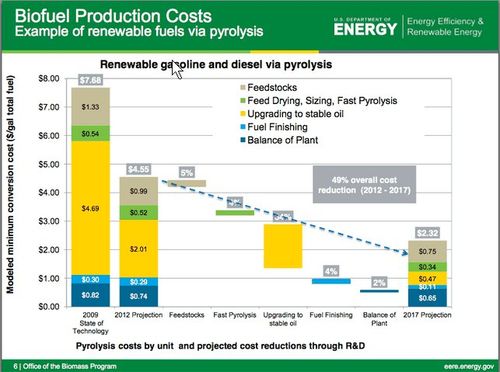You back a variety of technologies because you can't be certain where the breakthrough will come. You back losers because you don't want to miss the winner.
That's the big lesson of the biofuels business.
As the Department of Energy's Biomass program explains it, technologies like methanol production from corn or cellulose, and the Fischer-Tropsch process used to convert algae to fuel, had the early advantage. But when scaled and perfected pyrolysis, in which waste is burned in the absence of oxygen, often at relatively low temperatures, will actually work better.
Had you been looking at the field three years ago, you wouldn't have bet on this. Back then it could cost $7.68/gallon to use pyrolysis for fuel. Even today the cost is $4.55/gallon. But savings across the board, most especially in turning the resulting feedstock into stable oil for refining, will drop that to $2.32/gallon in five years, with a final price estimated at $2/gallon.

With pyrolysis, you're using existing supplies of solid waste as your feedstock. (This means even the plastics industry is enthusiastic.) You don't have to use food crops, you don't have to build special algae farms.
There are many ways of making this work, the method of Anellotech being just one of them.
The best known byproduct from this is biochar, a form of pure carbon that can stabilize soils and maintain their productivity for growing food crops.
People who complain about backing losers are never going to find the winner. That's why venture capitalists back lots of companies, expecting them to fail. They're looking for the old gold nugget.
Pyrolysis looks like a nugget.











The best known byproduct from this is biochar, a form of pure carbon that can stabilize soils and maintain their productivity for growing food crops.
The best known byproduct from this is biochar, a form of pure carbon that can stabilize soils and maintain their productivity for growing food crops.